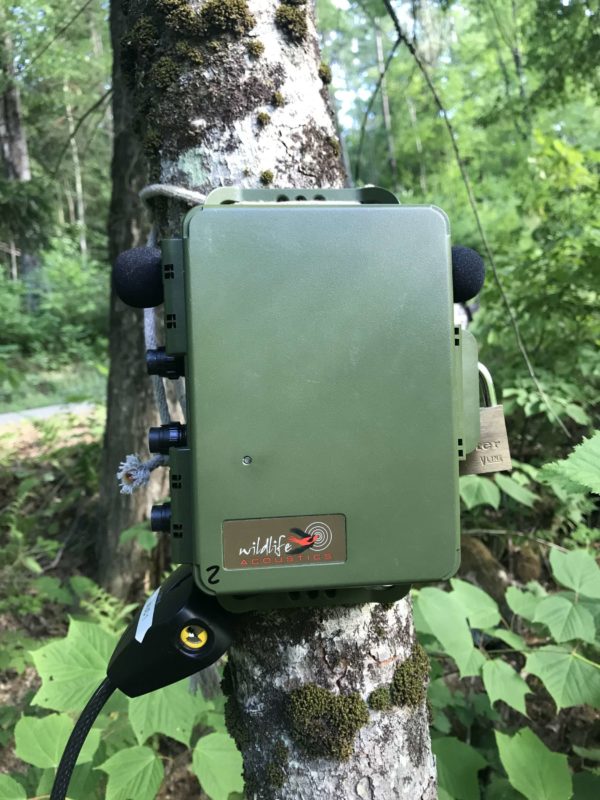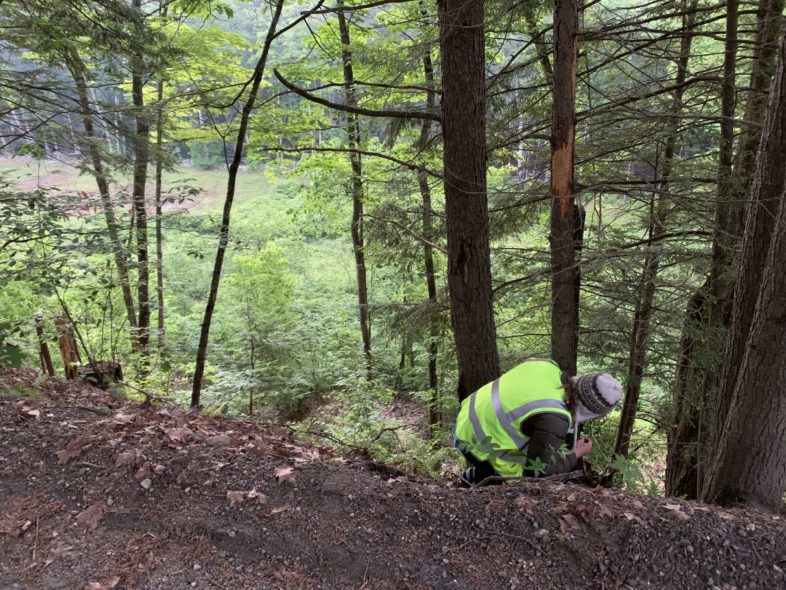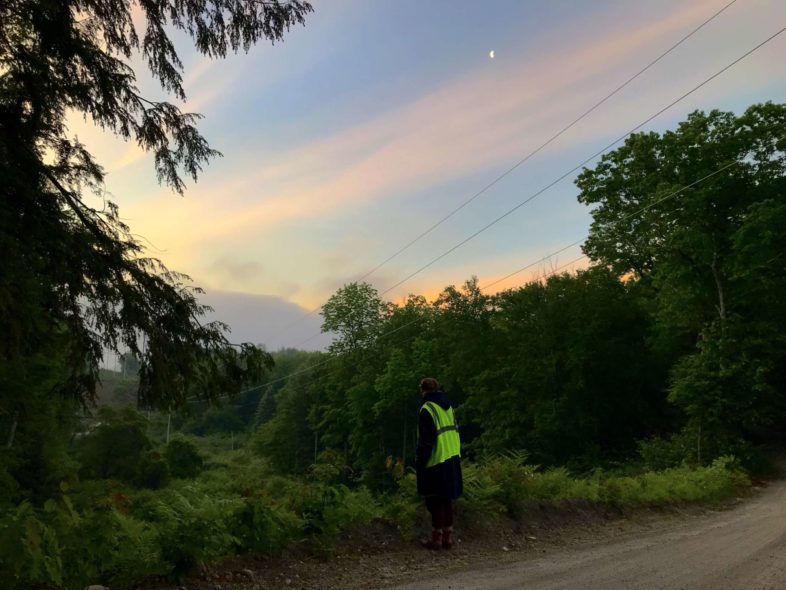From late spring into early summer, Vermont’s nocturnal wildlife is joined on backroads throughout the state by a small army of (temporarily) nocturnal humans. The field technicians and volunteers for VCE’s annual Eastern Whip-poor-will Survey are out collecting data on the state’s declining population of Eastern Whip-poor-wills.
This year, the team in Windham County welcomed the addition of another small army, less prone to becoming drowsy during late-night surveys: 10 small Automated Recording Devices (ARUs). ARUs can listen and record sounds with a fidelity very near our own ears. While our human surveyors listen at each point for 6 minutes before moving on to complete their 10-point route, these stationary ARUs listen for 3 hours each night. Any Whip-poor-will that calls near an ARU would be challenged to go undetected!

An automated recording device attached and locked to a tree, ready to begin recording in the last light following sunset. © Ben Fletcher
Even with our robotic reinforcements and a list of over 100 locations surveyed, the 2021 survey conducted in Windham County yielded zero Whip-poor-wills. Volunteers surveying other areas confirmed that historic hotspots like West Haven and Concord still host their dense and noisy numbers. However, it was a quiet season in Vermont’s southeastern corner!
Throughout most of Vermont, Whip-poor-will numbers have declined steadily for decades, however they seem to vanish from certain regions before others. While the 2021 survey investigated Windham County, last year focused on western Rutland County—and offered a dramatically different experience for surveyors. In contrast to this year’s disappointing results in Windham County, 97 unique Whip-poor-wills were heard throughout West Haven, Fair Haven, Benson, and Poultney in 2020. This region remains the enduring hotspot for Whip-poor-wills in the Green Mountain State.
This leaves us with a question: why do Vermont’s remaining Whip-poor-wills seem to prefer western Rutland County to Windham County? One possibility is that western Rutland County has more suitable habitat. Whip-poor-wills are high-maintenance—they need a mosaic of different kinds of adjacent habitat to nest and hunt. Losing any single piece of that mosaic threatens to spoil an area’s appeal and viability.
Whip-poor-wills also have particular taste when it comes to nesting habitat. They nest on forest edges, in areas of sandy, well-drained soil with minimal amounts of understory vegetation. (They don’t actually construct nests, instead laying their eggs in depressions in the leaf litter.) In Vermont, Whip-poor-wills can usually find their preferred soil conditions, which surveyors often identify by the nearby presence of gravel quarries and white pines. However, shrubs and other low vegetation tend to thicken forest understory over time. Both natural disturbances (fire) and human activity (logging) can set forest understory back to earlier stages where it’s more open. Whip-poor-wills benefit from this early-successional forest structure, more easily finding both nesting locations and their preferred food in this habitat type. Passive human activity—the act of abandoning farmland—can also create Whip-poor-will habitat, as the forest ultimately reclaims untended fields.

Affixing an automated recording device (ARU) to a tree, overlooking a marshy clearing. Forest edge seen beyond. © Emily Paribello
To further complicate a Whip-poor-wills’ search for appropriate habitat, these specific forest conditions must lie adjacent to hunting grounds suitable to this nocturnal insectivore. Ideal locations are open spaces with sizable populations of large-bodied insects. One convenient option is the powerline rights-of-way that are periodically cleared. These long stretches of low-growing plants offer excellent foraging opportunities. For example, an intersection of two powerline clearings near Concord still attracts a handful of Whip-poor-wills each year. If you live in northern Vermont, visit this lively spot to hear them calling on moonlit nights.

Sunrise near the end of the first window of the 2021 Eastern Whip-poor-will Survey. Moon seen over a powerline right-of-way. © Ben Fletcher
Despite needing a complex habitat mosaic, Windham County has a number of locations that still meet the Whip-poor-wills’ criteria—at least on paper. Both historic and anecdotal records suggest that the county once had a reliable resident population.
However, this leaves even more confusion in the wake of a lackluster season in Windham County. Why aren’t they there now? Have forests matured so much that Whip-poor-wills can no longer find nest sites? If powerline rights-of-way and other clearings are still available, do they no longer offer enough moths and other large-bodied insects to raise nestlings? In the delicate case of Whip-poor-wills, spoiling any one piece of their habitat mosaic spoils the viability of the whole. And perhaps, before long, western Rutland County looks like Whip-poor-will paradise in comparison.
To learn more about VCE’s annual Eastern Whip-poor-will survey, visit the Eastern Whip-poor-will Conservation and Monitoring page.

I remember falling asleep listening to a whip poor will singing out out every night near a stone wall right next to our house north of Brattleboro on summer evenings in the 1960’s. Very loud – but a great memory of a great place to grow up and something which I remember most fondly.
I love Whip-Poor-wills and I love this project, sounds like a fun time none the less!
One pair was breeding in Windham County in 2021 confirmed by sight and sound throughout the season. They were kinda hoping it would go away. The birds returned in 2022 and 2023 as confirmed on eBird. So there is a reliable breeding pair in the county but no others best we can tell. See YouTube @WhippoorwillVT for some videos of them calling and flying. I’ve named them Will and Echo. They left September 25th, a full week later than last year. They return in April